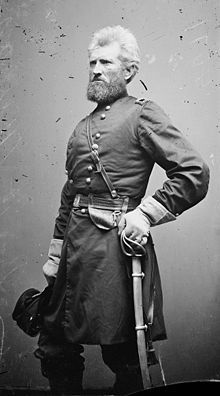 |
| General Milroy |
HEADQUARTERS ARMY OF NORTHERN VIRGINIA,
January 10, 1863.
Major General H. W. HALLECK,
Commander-in-Chief U. S. Army, Washington, D. C.:
GENERAL: I have the honor to transmit to you copies of two papers recently served upon Mr. Job Parsons, a citizen of Tucker County, Va., by the military authorities of the United States in that region.* The originals of these papers are now in the possession of His Excellency the President of the Confederate States, who has directed me to communicate with you on the subject.
I am unwilling to believe that such threats against unarmed and defenses citizens as are contained in the extract from what purports to be an order from Brigadier-General Milroy have received the sanction of any soldier, and have the honor to ask whether the extract from the order referred to is literally or substantially correct.
Should it unfortunately prove to be true. I am instructed to ask whether your Government will tolerate the execution of order so barbarous and so revolting to every principle of justice and humanity. Should you not deem it proper to respond to these inquiries it will be reluctantly assumed after the expiration of ten days from the date of this communication that the order is that of General Milroy, and that its execution will not be restrained. In that event I am directed to inform you that this Government will be completed to protect its citizens by the immediate adoption of stern retaliatory measures.
I have the honor to be, very respectfully, your obedient servant,
R. E. LEE,
General.
[First indorsement.]
JANUARY 15, 1863.
Respectfully refereed to Major-General Schenck to ascertain and report if the inclosed papers are copies of genuine originals.
Brigadier-General Milroy had no authority to issue these orders, which are deemed in violation of the laws of war. If such orders were actually issued must be revoked.
H. W. HALLECK,
General-in-Chief.
[Second indorsement.]
HEADQUARTERS EIGHT ARMY CORPS,
Baltimore, Md., January 16, 1863.
Respectfully referred to Brigadier-General Kelley, who will obtain from General Milroy the information called for by the General-in-Chief .
By command of Major-General Schneck:
WM. D. WHIPPLE,
Assistant Adjutant-General.
[Third indorsement.]
HEADQUARTERS DEFENSES UPPER POTOMAC,
Harper's Ferry, January 21, 1863.
Respectfully transmitted to Brigadier-General Milroy, who will report the information called for by the General-in-Chief.
By order of Brigadier-General Kelley:
T. MELVIN,
Assistant Adjutant-General.
---------------
* See enclosures Nos. 1 and 2, Imboden to Davis, December 9, 1862, Vol II, this series, p. 944.
---------------
Official Records, Series III., Vol. 3, Part 1, Page 11.
The Milroy incident related to a demand by the general that Southern sympathizers in the portion of West Virginia he occupied pay restitution to their Unionist neighbors for horses allegedly stolen from them. In reality, the Unionists had sold their horses elsewhere and then went to the army claiming they had been stolen. So they were paid for the same horses twice. Milroy added a twist by issuing this order; "If they fail to pay at the end of the time you have named their houses will be burned and themselves shot and their property all seized, and be sure that you carry out this threat rigidly and show them that you are trifling or to be trifled with. You will inform the inhabitants for ten or fifteen miles around your camp on all the roads approaching the town upon which the enemy may approach that they must dash in and give you notice and that upon failure of any one to do so their houses will be burned and the men shot."
Milroy would eventually occupy Winchester and inflict on its citizens his peculiar notions of justice. While there his force was captured by Ewell during the opening stages of the Gettysburg campaign. It is interesting to speculate the fate which would have awaited him had he himself been captured, as the Confederate government had taken a keen interest in his conduct. In any event Halleck would have him arrested for losing his division and a court of inquiry acquited him. But he was unable to find any but an administrative command for the remainder of the war as no general in the western theater would have him under their command.
No comments:
Post a Comment